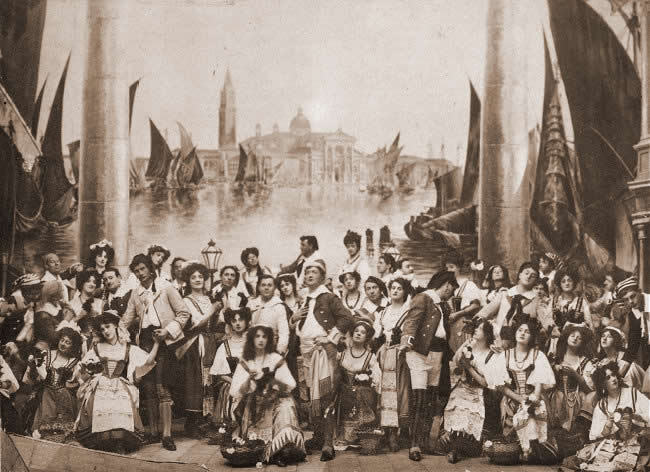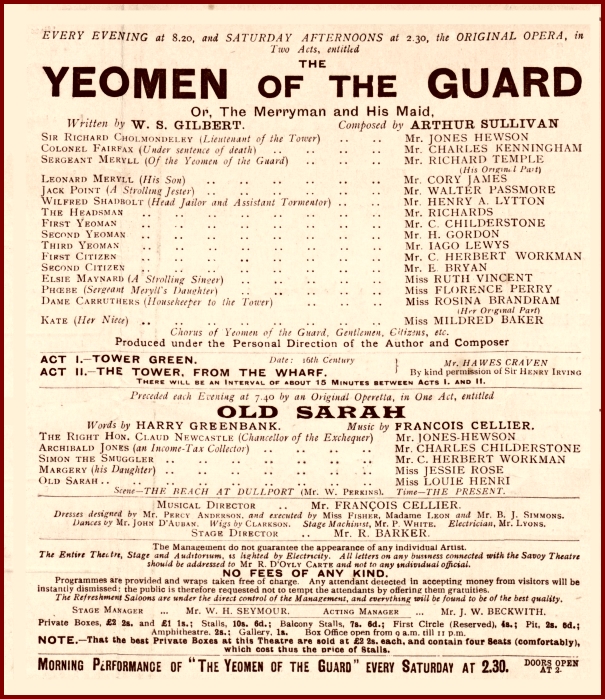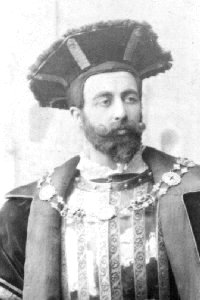|
Jones Hewson
John Jones Hewson (2 September 1874 – 27 November 1902), credited as Jones Hewson, was a Welsh singer and actor known for his creation and portrayal of baritone roles with the D'Oyly Carte Opera Company from 1894 to 1901. Hewson began in the chorus of the company, but soon moved up from smaller roles to larger ones on tour and then again from smaller roles to larger ones at the Savoy Theatre in London, earning critical praise. During his tenure with the company, he played more than two dozen of the baritone and bass-baritone roles in its repertory, and he created several roles in new Savoy Operas, including the Herald in ''The Grand Duke'', Baron Vincentius in '' His Majesty'', Nicholas Dircks in '' The Beauty Stone'' and the Earl of Newtown in ''The Emerald Isle''. In 1901, his health deteriorated from tuberculosis; he and his family travelled to Australia, hoping that the climate would help him to recover, but he died at the age of 28. Biography Hewson was born in Swansea, W ... [...More Info...] [...Related Items...] OR: [Wikipedia] [Google] [Baidu] |
Cox And Box
''Cox and Box; or, The Long-Lost Brothers'', is a one-act comic opera with a libretto by Francis Cowley Burnand, F. C. Burnand and music by Arthur Sullivan, based on the 1847 farce ''Box and Cox (farce), Box and Cox'' by John Maddison Morton. It was Sullivan's first successful comic opera. The story concerns a landlord who lets a room to two lodgers, one who works at night and one who works during the day. When one of them has the day off, they meet each other in the room and tempers flare. Sullivan wrote this piece five years before his first opera with W. S. Gilbert, ''Thespis (opera), Thespis''. The piece premiered in 1866 and was seen a few times at charity benefits in 1867. Once given a professional production in 1869, it became popular, running for 264 performances and enjoying many revivals and further charity performances. During the 20th century, it was frequently played by the D'Oyly Carte Opera Company in an abridged version, as a Curtain raiser (drama), curtain raiser ... [...More Info...] [...Related Items...] OR: [Wikipedia] [Google] [Baidu] |
The Gondoliers
''The Gondoliers; or, The King of Barataria'' is a Savoy Opera, with music by Arthur Sullivan and libretto by W. S. Gilbert. It premiered at the Savoy Theatre on 7 December 1889 and ran for a very successful 554 performances (at that time the fifth longest-running piece of musical theatre in history), closing on 30 June 1891. This was the twelfth comic opera collaboration of fourteen between Gilbert and Sullivan. The story of the opera concerns brothers Marco and Giuseppe Palmieri, a pair of Venetian gondoliers who are told that one of them is heir to the throne of the fictional kingdom of Barataria; until it can be discovered by the Grand Inquisitor which of them is the heir, they must rule jointly. Unbeknownst to the brothers, who have just married Venetian farm girls, the heir was wed in infancy to the daughter of the Spanish Duke of Plaza-Toro, who is herself in love with her father's servant. A subplot concerns the impoverished Duke attempting to improve his finances ... [...More Info...] [...Related Items...] OR: [Wikipedia] [Google] [Baidu] |
Nellie Farren
Ellen "Nellie" Farren (16 April 1848 – 28 April 1904"Death of Nellie Farren" ''The New York Times'', April 29, 1904, p. 9) was an English actress and singer known for her roles as the "principal boy" in Victorian burlesque, musical burlesques at the Gaiety Theatre, London, Gaiety Theatre in London. For a quarter of a century there, she was "the best-known star of London burlesque". Born into a theatrical family, Farren began acting as a child. She made her professional adult debut in 1864 and joined the company at London's Olympic Theatre (London), Olympic Theatre, performing in Shakespeare's plays, Shakespeare, contemporary comedies, dramas and musical burlesques. From 1868 to 1892, she performed at the Gaiety Theatre, which specialised in musical burlesque, becoming famous i ... [...More Info...] [...Related Items...] OR: [Wikipedia] [Google] [Baidu] |
Trial By Jury
A jury trial, or trial by jury, is a legal proceeding in which a jury makes a decision or findings of fact. It is distinguished from a bench trial, in which a judge or panel of judges makes all decisions. Jury trials are increasingly used in a significant share of serious criminal cases in many common law judicial systems, but not all. Juries or lay judges have also been incorporated into the legal systems of many civil law countries for criminal cases. The use of jury trials, which evolved within common law systems rather than civil law systems, has had a profound impact on the nature of American civil procedure and criminal procedure rules, even if a bench trial is actually contemplated in a particular case. In general, the availability of a jury trial if properly demanded has given rise to a system in which fact finding is concentrated in a single trial rather than multiple hearings, and appellate review of trial court decisions is greatly limited. Jury trials are of fa ... [...More Info...] [...Related Items...] OR: [Wikipedia] [Google] [Baidu] |
The Grand Duchess Of Gerolstein
''The'' is a grammatical article in English, denoting nouns that are already or about to be mentioned, under discussion, implied or otherwise presumed familiar to listeners, readers, or speakers. It is the definite article in English. ''The'' is the most frequently used word in the English language; studies and analyses of texts have found it to account for seven percent of all printed English-language words. It is derived from gendered articles in Old English which combined in Middle English and now has a single form used with nouns of any gender. The word can be used with both singular and plural nouns, and with a noun that starts with any letter. This is different from many other languages, which have different forms of the definite article for different genders or numbers. Pronunciation In most dialects, "the" is pronounced as (with the voiced dental fricative followed by a schwa) when followed by a consonant sound, and as (homophone of the archaic pronoun ''thee'' ... [...More Info...] [...Related Items...] OR: [Wikipedia] [Google] [Baidu] |
Old Sarah
''Old Sarah'' is a one-act comic opera composed by François Cellier with a libretto by Harry Greenbank. The piece was first produced at the Savoy Theatre from 17 June to 31 July 1897 and from 16 August to 20 November 1897 as a companion piece to ''The Yeomen of the Guard'', from 10 December 1897 to 12 March 1898 with ''The Grand Duchess of Gerolstein'', and from 22 March to 21 May 1898 with ''The Gondoliers'', for a total of 252 performances. A copy of the vocal score (published in 1898 by J. Williams), but no printed libretto, is found in British Library. The score contains all the dialogue. Background When the Gilbert and Sullivan partnership disbanded after the production of ''The Gondoliers'' in 1889, the impresario Richard D'Oyly Carte filled the Savoy Theatre with a combination of new works and revivals of the Gilbert and Sullivan operas. The fashion in the late Victorian era was to present long evenings in the theatre, and so producer Richard D'Oyly Carte preceded his ... [...More Info...] [...Related Items...] OR: [Wikipedia] [Google] [Baidu] |
The Times
''The Times'' is a British Newspaper#Daily, daily Newspaper#National, national newspaper based in London. It began in 1785 under the title ''The Daily Universal Register'', adopting its modern name on 1 January 1788. ''The Times'' and its sister paper ''The Sunday Times'' (founded in 1821), are published by Times Media, since 1981 a subsidiary of News UK, in turn wholly owned by News Corp. ''The Times'' and ''The Sunday Times'' were founded independently and have had common ownership only since 1966. It is considered a newspaper of record in the UK. ''The Times'' was the first newspaper to bear that name, inspiring numerous other papers around the world. In countries where these other titles are popular, the newspaper is often referred to as or , although the newspaper is of national scope and distribution. ''The Times'' had an average daily circulation of 365,880 in March 2020; in the same period, ''The Sunday Times'' had an average weekly circulation of 647,622. The two ... [...More Info...] [...Related Items...] OR: [Wikipedia] [Google] [Baidu] |
The Yeomen Of The Guard
''The Yeomen of the Guard; or, The Merryman and His Maid'', is a Savoy Opera, with music by Arthur Sullivan and libretto by W. S. Gilbert. It premiered at the Savoy Theatre on 3 October 1888 and ran for 423 performances. This was the eleventh collaboration of fourteen between Gilbert and Sullivan. The opera is set in the Tower of London during the 16th century, and is the darkest, and perhaps most emotionally engaging, of the Savoy Operas, ending with a broken-hearted main character and two very reluctant engagements, rather than the usual numerous marriages. The libretto does contain considerable humour, including a lot of pun-laden one-liners, but Gilbert's trademark satire and topsy-turvy plot complications are subdued in comparison with the other Gilbert and Sullivan operas. The dialogue, though in prose, is quasi-Shakespearean, or early modern English, in style. Critics considered the score to be Sullivan's finest, including its overture, which is in sonata form, rather ... [...More Info...] [...Related Items...] OR: [Wikipedia] [Google] [Baidu] |
Sir Richard Cholmondeley
Sir Richard Cholmondeley (or Cholmeley) (c. 1460–1521) was an English farmer and soldier, who served as Lieutenant of the Tower of London from 1513 to 1520 during the reign of Henry VIII. He is remembered because of his tomb at the Tower of London and because he is fictionalized as a character in Gilbert and Sullivan's darkly comic opera, ''The Yeomen of the Guard''. Cholmeley's name has frequently been misspelled "Cholmondeley" because of its misspelling in the plaque on his tomb, which led to the misspelling of the character's name in the opera; other branches of Cholmeley's family use the longer spelling. Knighted in 1497 for valour in battle against the Scots, Cholmeley continued to serve as a soldier until 1513, becoming entrusted with many positions of responsibility for security of castles and fortifications in England. He was successful as a farmer and a shrewd investor in land, much increasing his family wealth. As Lieutenant of the Tower of London, he drew criticism ... [...More Info...] [...Related Items...] OR: [Wikipedia] [Google] [Baidu] |
Rutland Barrington
Rutland Barrington (15 January 1853 – 31 May 1922) was an English singer, actor, comedian and Edwardian musical comedy star. Best remembered for originating the lyric baritone roles in the Gilbert and Sullivan operas from 1877 to 1896, his performing career spanned more than four decades. He also wrote at least a dozen works for the stage. After two years with a comic touring company, Barrington joined Richard D'Oyly Carte's opera company and, over the next two decades, created a number of memorable comic opera roles, including Captain Corcoran in ''H.M.S. Pinafore'' (1878), the Sergeant of Police in ''The Pirates of Penzance'' (1880), and Pooh Bah in ''The Mikado'' (1885), among many others. Failing in an 1888 attempt to become a theatrical manager, Barrington refocused his energies on acting and occasional playwriting. Beginning in 1896 and continuing for ten years, Barrington played in a series of very successful musical comedies under the management of George Edwardes ... [...More Info...] [...Related Items...] OR: [Wikipedia] [Google] [Baidu] |







